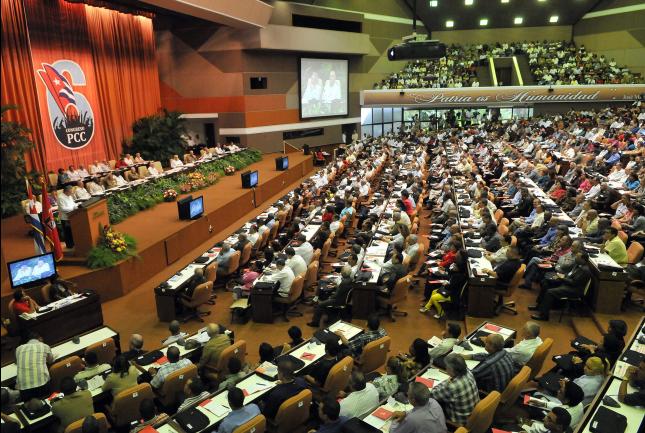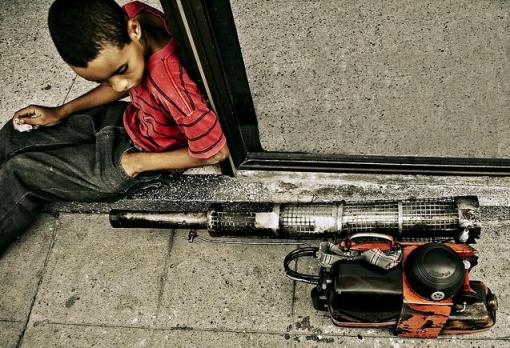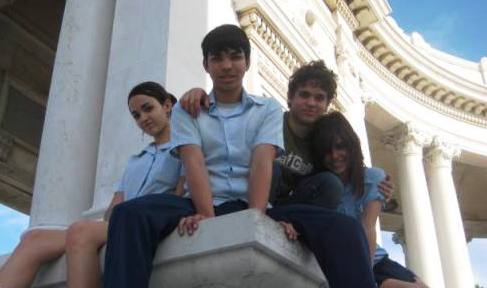Fidelism
Cuba emerged on the international map as a tiny little island threatened and blocked by a powerful neighbor. With an excellent lecture from Sun Tzu and Machiavelli; without forgetting Gustave Le Bon, Fidel convinced the majority that he was speaking for the Fatherland, and the Fatherland was the Revolution and was Socialism. Fidel was young then, he was charismatic, and his revolution of the humble, with the humble, and for the humble was irresistible for the international left and for those Cubans who, in the immense majority, didn’t possess political culture, and followed a leader, not an ideology.
The consolidation of totalitarianism counted on a majority approving. I am talking now of the generation which followed that which staged the Revolution, so permeated with its mystique that it even felt an absurd complex for not having been born earlier. That generation received the education of the New Man, where Morals and Civics — a subject in the formation of values — was abolished from curricula as a backwardness of the past. From that point and continuing today, education has a strong ideological component which displays itself from the earliest reading books.
How does the minority fit in this context? In various forms they are led to exile (… we don’t want them, we don’t need them!). The facts demonstrated that it was safer for those with divergent opinions to leave. There were, nonetheless, some who didn’t accept exile as a solution and decided to oppose. Many of them completed sentences for crimes against the security of the state for reasons that did not generally include violent acts.
The sensation of an omnipotent and omnipresent State was weaving itself into society. The institutions of society were replaced with organizations like the Committees for the Defense of the Revolution, to mention the most widespread. We are coming to the moment of the disappearance of the socialist camp, when against all logic, the Cuban government keeps itself going. It is the Special Period in peacetime: we had heard of the fall of the Berlin Wall talked about, and Cuba was going from blackout to blackout to the rhythm of bicycles with a stifling shortage of food. Everything they taught in the schools about philosophy and materialism had become doubtful.
It might have looked like the moment to develop an economic sustainability following the cutoff of Soviet support. The possession of cash was depenalized, and a timid little hole was opened to foreign investment and tourism. Nonetheless, ill will and the lack of perspective metastasize in society. Once more the subliminal feed to search for the solution beyond our borders. In this context on August 5, 1994 the “Maleconazo” happened: a growing group of people met on the Malecón in hopes of a boat to go to the United States, an absolutely spontaneous explosion of people who channeled their frustration down the path of violence. There they shouted “Down with Fidel!”, but they weren’t looking for democracy. If someone yelled “Freedom!”, they meant freedom to leave the country. There were other outbursts, I remember one at the University of Oriente rooted in the rape of a student by the abandonment of university areas, and most recently one in Santa Clara where youths mutinied for not being able to enjoy a football match of the Spanish League, the very same city in which Guillermo Fariñas had carried out his hunger strike just a little earlier.
Constant Repression of Low Intensity
Although I know Cubans who’ve lived repression at its ugliest edge, citizens in general perceive a low-intensity repression which is everywhere in national life. This has been a success of the government, which has brought aspirations of emigration to the immense majority of the discontented, and another good part will try to prosper while wearing a mask. Both groups are convinced that “no, you cannot” against the repressive machine of “Papa” who knows everything.
The control of information is the key to this strategy. The voices of dissent are quickly accused of working for the CIA, and they are held up as enemies of the people when they only aspire to be critical voices or political adversaries. Some examples of the accusations: Orlando Zapata (a common criminal), Elizardo Sánchez (el Camaján — the snake in the grass), Yoani Sánchez (a fabrication of the Americans, child of the Prisa Group — a Spanish commercial media group), and Guillermo Fariñas (a woman-beater).
The Media spend a lot of time showing poverty in other countries and the eternal crisis of capitalism. They appeal to generalizations and half-truths while pretending to convince us that we’re just badly off, but we could be much worse, and for that we should be grateful for what we have. This panorama is dominated by the overblown Embargo which should have disappeared a long time ago and serves the Cuban government as a justification for its deficiencies.
Fidel’s illness opens a parenthesis in the national context. Having stayed away for many months from public life, he reappears talking about climate change and other global subjects, while his disconcerted followers ask themselves when he will give the precise indication, the word that will orient them. His public interventions are very distant from the deteriorating national situation; it’s clear that this is not his subject of interest, to have it be so he would have to start with a self-criticism and by begging pardon for having said so much nonsense. Fidelistas disoriented on the one hand and a president who doesn’t seem to be fully in control of his faculties; the new year brings us the domino effect in North Africa and we Cubans ask ourselves if the moment has come here too from beyond the Atlantic.
In another post on this theme I mentioned three elements that have called my attention to the fall of Mubarak: spontaneity, the role of new technologies, and the Army. After having read something about the subject, I have changed my position. And although I find notable coincidences between Egypt and Cuba, there are also profound differences. Egypt was governed by a dictator, but it was not a totalitarian state; opposition parties and civil society found themselves structured and inside the limits of legality. The officer corps in the Army seems to be professionally trained, many graduated from institutions in the West, and when posed with the dilemma of supporting the government or the people, opted for the second. Islam is another cohesive influence, and Egyptians find themselves familiar with communications technologies, with the so-called Web 2.0, and through it they found themselves structured by affinities beforehand with the call of Wael Ghonim from Facebook.
For The Popular Uprising in Cuba
So is titled the Facebook page that encourages Cubans to imitate that which they’re already doing in Mediterranean Africa and beyond. I presume the good faith of he or they who, from abroad, launched this initiative, but at the risk of receiving more criticisms and accusations, I continue to think that it’s a flawed initiative. Since last Monday, I have approached a considerable group of youths with different interests — some I know. others I don’t, and I have asked them three questions. The first, if they have a Facebook account — that which surprised me, everybody (!) responded yes. The second, if they knew of the initiative launched from abroad or from other internal call for the anniversary of the death of Orlando Zapata, to which everyone answered no. The majority had gone days without being able to log on to their accounts. The others hadn’t received anything (I don’t exclude that some had indeed received it and hadn’t wanted to give themselves away). The third question was if they knew where potatoes were sold. Except for three men and a girl, the rest gave me satisfactory responses. I don’t know about those who read this, but that says something to me.
In this subject of the Facebook call, voices from inside and outside are not in agreement (which is normal and healthy), but from both groups darts have been thrown in the wrong direction. I have read opinions situated in ears opposed to the promoters of For the Uprising … and to those like me who show doubts of its success. Speaking for myself, my sympathies are with the call, although emotion cannot cloud reason. I don’t possess the information that will make others ready with a single click, but nobody can take the pulse on the streets like those who live in Cuba. That gives me a little advantage.
I can’t imagine a youth with a Facebook account in Cuba using his connection time to promote ideological affinities; neither do I visualize that young man from the UCI convincing a group of contemporaries to participate in the event in the Avenida de las Misiones and keeping his registration in said study center. These complications aren’t established at short-range, these complications aren’t established openly and with speed in university centers, youth bulletins but with the Pavlovian reflex of fear.
These are the scenarios: It’s possible that the level ground in front of the Museum of the Revolution might be the site this week for the University Students Federation (FEU) group in an activity organized by the National Committee of the Young Communist League (UJC) whose headquarters is across the street. It could be that the police might be threatening those called to the uprising to abandon the place. A third possibility is that the activity gets out of control, the police might intervene to protect the “small groups” of “indignant people.” It’s possible that the known opposition could be detained to keep them from coming.
What will happen in front of the old Presidential Palace? I haven’t noticed the magic spark, nonetheless I could be wrong about the power of suggestion of the news among youth. They will decide when and where.
Translated by: JT
February 21 2011












